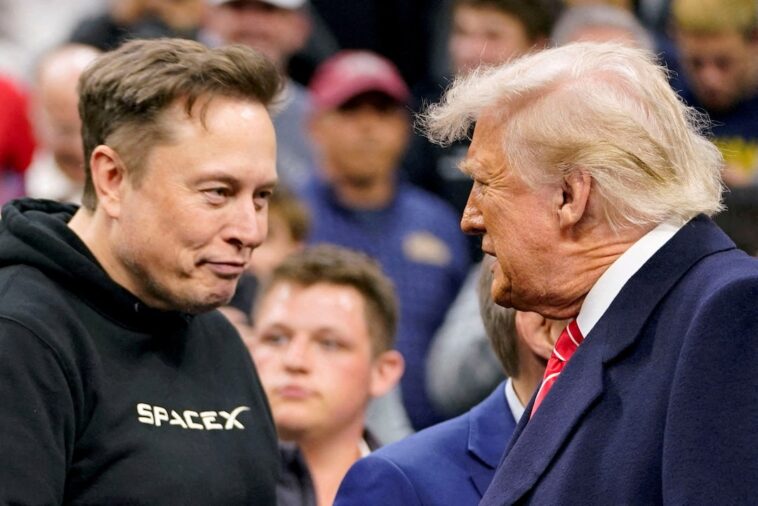Following a public disagreement with President Trump over aspects of a significant spending bill, Elon Musk, the world’s wealthiest individual, revealed his intention to institute a new political party in the United States, labeled the ‘America Party.’ Musk’s announcement comes in the wake of Trump’s critique of the party, stating that it has the potential to generate disruption and turmoil.
Musk, with reservations over the impact of the spending bill on the nation’s debt, held a position that was diametrically opposed to Trump’s defense of the same. This fueled the public confrontation between the two prominent figures. A month after their disagreement concerning the enormous funding bill and apprehensions over escalating federal debt, Musk deployed the ‘America Party.’
Justified by his stance opposing ‘waste & graft’ contributing to the country’s bankruptcy, Musk made his party’s formation known on July 5th. The intent behind the ‘America Party’, according to Musk, is to restore citizens’ full freedom, thereby challenging the one-party system that he perceives as failing the democratic ethos of the country.
Adding fuel to the fire, Trump proceeded to sign his disputed bill into legislation on July 4, just a day before Musk’s revealing statement regarding the formation of a new political entity. Trump’s move triggered Musk to publicly vocalize his resistance, thereby further crystallizing the ideological rift between them.
In aftermath of Musk’s party announcement, Trump didn’t shy away from expressing his disapproval and concern about Musk’s political maneuver. On July 6, Trump lamented Musk’s drastic shift, comparing his unfolding actions over the past several weeks to a ‘train wreck.’ Despite the historical lack of success of Third Political Parties in the U.S., Musk seemed adamant about his political venture.
Trump, in an acerbic tone, affirmed that Third Parties primarily breed ‘total disruption and chaos.’ He argued fiercely that the society was already inundated with enough turmoil owing to the ‘Radical Left Democrats,’ implying that the addition of a Third Party was unnecessary and detrimental.
Treasury Secretary Scott Bessent echoed Trump’s sentiments, striking a critical tone toward Musk’s novel formation, suggesting that Musk had little popularity within the current administration. This can be seen as a surprising development given Musk’s prior support for the administration.
In the early phases of the Trump administration, Musk was a significant figure, having aided Republican campaigns, including Trump’s, with his generous contributions running into hundreds of millions. Additionally, he was instrumental in efforts to reduce operating costs across federal agencies via the Department of Government Efficiency initiative.
The Trump-endorsed bill, which is at the crux of these surging political tensions, is set to add an estimated $3.4 trillion to the national debt over a decade. The nonpartisan Congressional Budget Office also forecasts a $5 trillion surge in the debt ceiling. Musk consistently voiced strong resistance to the bill’s impact on national debt, expressing his desire to back primary challengers against bill supporters.
Musk openly denounced the bill’s supporter with a statement that insinuated they should be ashamed if they voted for the bill, especially if they had earlier campaigned on promises of curtailing government expenditure. He went as far as to assert that he would personally ensure their defeat in the next primary.
In the Senate-backed version of the bill, numerous public safety net programs are destined for significant cuts, potentially leading to millions of Americans being stripped of their insurance and benefits. Medicaid is predicted to suffer the brunt of the impact, with estimates of approximately $1 trillion being removed from the program over the ensuing decade.
According to the nonpartisan Congressional Budget Office, the reduction could culminate in nearly 12 million Americans being without insurance by 2034. Once the President put his signature on the bill, pushing it into law, various aspects will come into play over the upcoming year.
The intricate bill spans an array of government expenditure areas, with each provision set into action at different times. Highlighted among them are new work requirements for Medicaid beginning from Jan 1, 2027, and the extension of the soon-to-expire tax cuts.
The bill also provisionally permits workers to deduct up to $25,000 each in tips and overtime, effective until the end of 2028. The Child Tax Credit sees a permanent increase to a maximum amount of $2,200, effective from 2025.
Lastly, the bill offers a temporary measure of relief for seniors, incorporating a $6,000 deduction for individuals over 65 and abolishing Social Security tax liability for those with adjusted gross incomes less than certain thresholds. This provision is set to last between 2025 to 2029.

